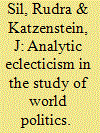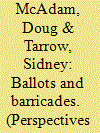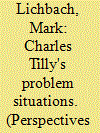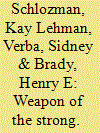|
|
|
Sort Order |
|
|
|
Items / Page
|
|
|
|
|
|
|
| Srl | Item |
| 1 |
ID:
097625


|
|
|
|
|
| Publication |
2010.
|
| Summary/Abstract |
This article defines, operationalizes, and illustrates the value of analytic eclecticism in the social sciences, with a focus on the fields of comparative politics and international relations. Analytic eclecticism is not an alternative model of research or a means to displace or subsume existing modes of scholarship. It is an intellectual stance that supports efforts to complement, engage, and selectively utilize theoretical constructs embedded in contending research traditions to build complex arguments that bear on substantive problems of interest to both scholars and practitioners. Eclectic scholarship is marked by three general features. First, it is consistent with an ethos of pragmatism in seeking engagement with the world of policy and practice, downplaying unresolvable metaphysical divides and presumptions of incommensurability and encouraging a conception of inquiry marked by practical engagement, inclusive dialogue, and a spirit of fallibilism. Second, it formulates problems that are wider in scope than the more narrowly delimited problems posed by adherents of research traditions; as such, eclectic inquiry takes on problems that more closely approximate the messiness and complexity of concrete dilemmas facing "real world" actors. Third, in exploring these problems, eclectic approaches offer complex causal stories that extricate, translate, and selectively recombine analytic components-most notably, causal mechanisms-from explanatory theories, models, and narratives embedded in competing research traditions. The article includes a brief sampling of studies that illustrate the combinatorial potential of analytic eclecticism as an intellectual exercise as well as its value in enhancing the possibilities of fruitful dialogue and pragmatic engagement within and beyond the academe.
|
|
|
|
|
|
|
|
|
|
|
|
|
|
|
|
| 2 |
ID:
097631


|
|
|
|
|
| Publication |
2010.
|
| Summary/Abstract |
Why do two cognate literatures-social movements and electoral studies-travel along parallel paths with little conversation between them? And what can be done to connect them in the future? Drawing on their work with the late Charles Tilly on Dynamics of Contention (2001), Doug McAdam and Sidney Tarrow examine two important studies that approach (but do not effect such a linkage), propose a mechanism-based set of linkages between elections and social movements, and apply their approach in a preliminary examination of the relations between the American anti-war movement after 9/11 and the Democratic Party.
|
|
|
|
|
|
|
|
|
|
|
|
|
|
|
|
| 3 |
ID:
097632


|
|
|
|
|
| Publication |
2010.
|
| Summary/Abstract |
During his long and distinguished career, Charles Tilly addressed the problem situation he inherited from his teacher Barrington Moore, the situation that emerged in the middle of his studies, and the problems that arose later in his life. Moore's core themes were revolutionary classes, revolutionary violence, and the outcomes of revolution. As the 1960s and the 1970s gave way to the 1980s and 1990s, Tilly faced a different world-historical situation. So-called national liberation moments-violent and radical, communist and anti-U.S.-did not always win. And when they did succeed, radical politics was not particularly appealing. Tilly's final challenge involved rational-choice theory's drive for hegemony in explaining all outcomes-political, economic, and social-of macrohistorical change. For example, could a systematic alternative to the major approach to contention and conflict-a bargaining theory of war-be developed? To address these changing problem situations, Tilly fashioned his own unique theories, methods, and domains of inquiry. A truly seminal thinker, he pioneered now standard social-scientific approaches to mechanisms, contentious politics, and state construction. To understand Charles Tilly is therefore to understand the last fifty years of historical and comparative social science.
|
|
|
|
|
|
|
|
|
|
|
|
|
|
|
|
| 4 |
ID:
097630


|
|
|
|
|
| Publication |
2010.
|
| Summary/Abstract |
Randomized field experiments have gained attention within the social sciences and the field of democracy promotion as an influential tool for causal inference and a potentially powerful method of impact evaluation. With an eye toward facilitating field experimentation in democracy promotion, I present the first field-experimental study of international election monitoring, which should be of interest to both practitioners and academics. I discuss field experiments as a promising method for evaluating the effects of democracy assistance programs. Applied to the 2004 presidential elections in Indonesia, the random assignment of international election observers reveals that even though the election was widely regarded as democratic, the presence of observers had a measurable effect on votes cast for the incumbent candidate, indicating that such democracy assistance can influence election quality even in the absence of blatant election-day fraud.
|
|
|
|
|
|
|
|
|
|
|
|
|
|
|
|
| 5 |
ID:
097628


|
|
|
|
|
| Publication |
2010.
|
| Summary/Abstract |
Penn State's decision to eliminate political theory set off existential angst about the status of political theory in the discipline. The organized, defensive responses to that decision failed to answer the central question it posed: Is "political theory" social science, and if not, why does it belong? I argue that social scientific political theory is political science and its many strains-conceptual, normative, and explanatory-belong in the discipline on their own terms. Humanistic research, like dermatology or music theory, is not political science and as such it should find another home. By explaining why (and what kinds of) political theory is political science this article may wind up being offensive in both senses of the word. But it is meant to be in service to a more secure, stable, and productive interdisciplinary future for all kinds of political theory going forward.
|
|
|
|
|
|
|
|
|
|
|
|
|
|
|
|
| 6 |
ID:
097626


|
|
|
| 7 |
ID:
097627


|
|
|
|
|
| Publication |
2010.
|
| Summary/Abstract |
Criticism of trends in political science centers on specific methodologies-quantitative methods or rational choice. However, the more worrisome development is scholasticism-a tendency for research to become overspecialized and ingrown. I define that trend more closely and document its growth through increases in numbers of journals, organized sections in the American Political Science Association, and divisions within the APSA conference. I also code articles published in the American Political Science Review to show a growth in scholastic features in recent decades. The changes affect all fields in political science. Scholasticism serves values of rigor. To restrain it will require reemphasizing relevance to real-world issues and audiences. To do this should also help restore morale among political scientists.
|
|
|
|
|
|
|
|
|
|
|
|
|
|
|
|
| 8 |
ID:
097629


|
|
|
|
|
| Publication |
2010.
|
| Summary/Abstract |
What is the impact of the possibility of political participation on the Internet on long-standing patterns of participatory inequality in American politics? An August 2008 representative survey of Americans conducted by the Pew Internet and American Life Project provides little evidence that there has been any change in the extent to which political participation is stratified by socio-economic status, but it suggests that the web has ameliorated the well-known participatory deficit among those who have just joined the electorate. Even when only that subset of the population with Internet access is considered, participatory acts such as contributing to candidates, contacting officials, signing a political petition, or communicating with political groups are as stratified socio-economically when done on the web as when done offline. The story is different for stratification by age where historically younger people have been less engaged than older people in most forms of political participation. Young adults are much more likely than their elders to be comfortable with electronic technologies and to use the Internet, but among Internet users, the young are not especially politically active. How these trends play out in the future depends on what happens to the current Web-savvy younger generation and the cohorts that follow and on the rapidly developing political capacities of the Web. Stay logged on …
|
|
|
|
|
|
|
|
|
|
|
|
|
|
|
|
|
|
|
|
|